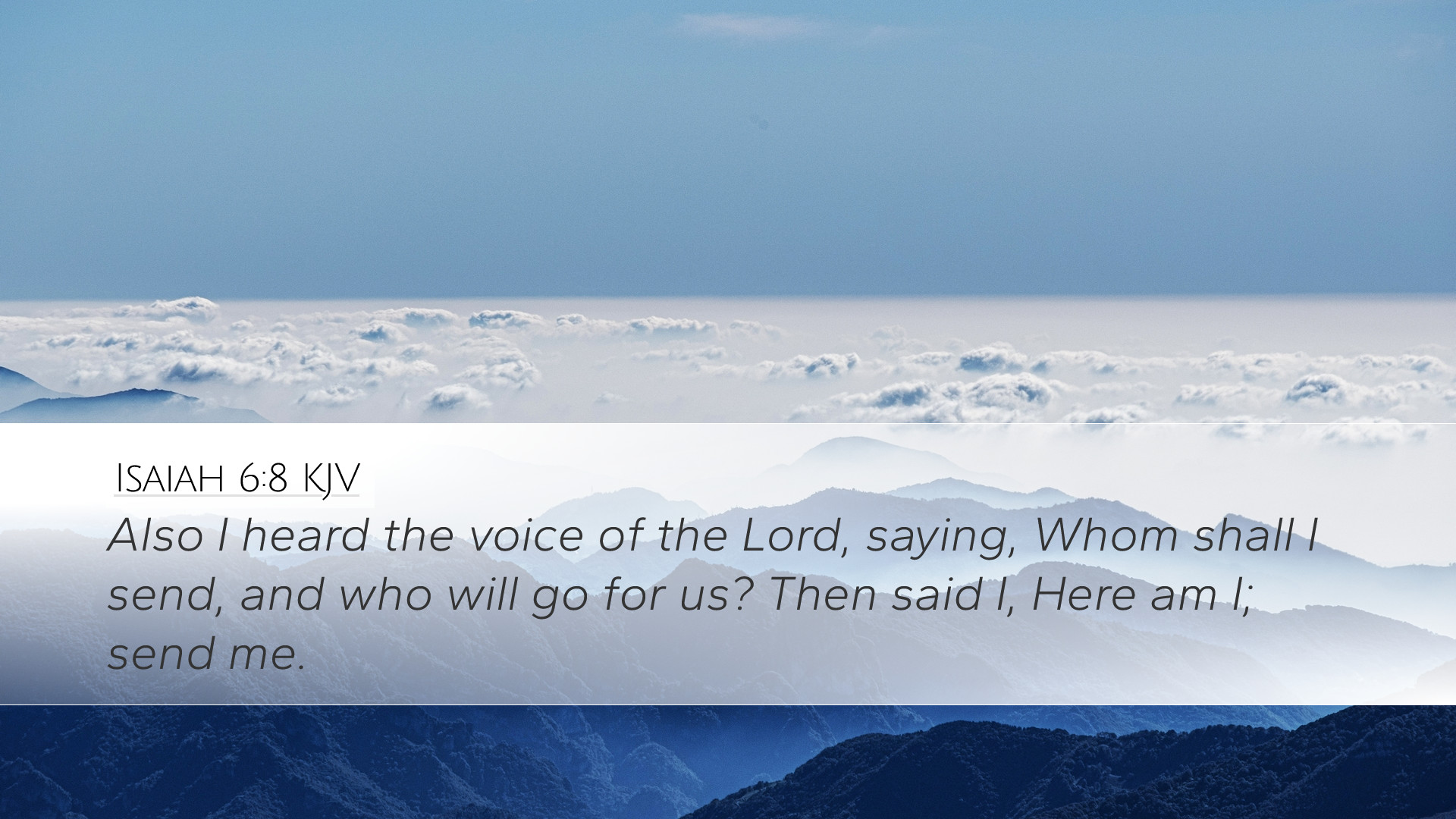Commentary on Isaiah 6:8
Isaiah 6:8 is a pivotal verse within the context of the prophet Isaiah’s calling and the subsequent purpose of his ministry. This verse encapsulates the divine commissioning that Isaiah receives after witnessing the grandeur of God’s holiness and greatness. The following commentary synthesizes insights from renowned public domain commentaries, emphasizing its significance for pastors, students, theologians, and Bible scholars.
Text of Isaiah 6:8
"Then I heard the voice of the Lord, saying: 'Whom shall I send, and who will go for us?' And I said, 'Here am I. Send me!'"
Contextual Overview
To fully grasp the depth of Isaiah 6:8, one must consider the immediate context in Isaiah 6, where the prophet has a profound vision of God seated on His throne, surrounded by seraphim who glorify Him. This profound experience of God’s holiness is coupled with Isaiah’s recognition of his own unworthiness, leading to his cleansing when a seraph touches his lips with a coal from the altar (Isaiah 6:6-7). It is in this context of utter reverence and transformation that Isaiah responds to the divine call in verse 8.
Understanding the Divine Call
The question from the Lord—“Whom shall I send?”—reflects God’s active engagement in the world and His desire for human agents to accomplish His purposes. According to Matthew Henry, this question indicates not only God’s initiative in seeking a messenger but also the seriousness of the task that Isaiah is being called to undertake. Henry emphasizes that God desires willing service rather than compelled obedience.
Response of Willingness
Isaiah’s reply, “Here am I. Send me!” serves as a model for all who are called. Albert Barnes highlights the eagerness present in Isaiah’s response. His identification of himself as available reflects a heart that is not only cleansed but also committed to fulfilling the will of God. This response illustrates the essence of a prophetic ministry characterized by humility, availability, and readiness to serve.
Theological Implications
This verse can be perceived as a call to mission, both for Isaiah and for every subsequent follower of God. Adam Clarke points out that Isaiah’s mission is not solely to proclaim God’s message but also to engage with a people whose hearts are “dull”—there’s an inherent challenge in wilderness ministry which requires a preparation of the speaker’s heart to faithfully deliver difficult truths. Thus, the divine call in Isaiah 6:8 serves as a profound reminder that the call to serve God often intersects with the challenges of ministry.
Human Participation in Divine Will
The phrase, “send me,” is crucial as it encapsulates the willingness to participate in God’s redemptive plan. Matthew Henry also notes that this highlights God’s expectation for His people to accept the call and take responsibility for their mission in the world. The dialogue suggests a partnership between the divine and the human, where God’s purposes are realized through the actions of those He calls.
Application for Modern Readers
For current scholars, students, and pastors, Isaiah 6:8 serves as a challenge to examine their willingness to respond to God’s call in their lives. Are we prepared to declare, “Here am I, send me!” in our vocations, communities, and local church settings?
- Self-Examination: Reflect on one’s own readiness to answer God’s call amidst societal challenges.
- Preparing the Heart: Understanding the necessity of spiritual purification and commitment to serving God effectively.
- Community Engagement: How can churches foster an environment that encourages members to discern and pursue their missional vocations?
Conclusion
Isaiah 6:8 stands as a timeless testament to the nature of divine calling and human response. The insights drawn from Henry, Barnes, and Clarke unveil layers of meaning that resonate deeply for pastors, church leaders, and all believers. As individuals seek to fulfill their God-given purpose, they are encouraged to respond with willing hearts, echoing Isaiah’s profound commitment to serve God’s kingdom.


